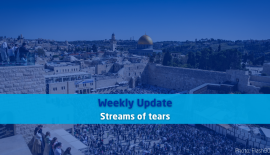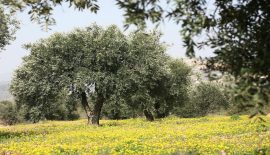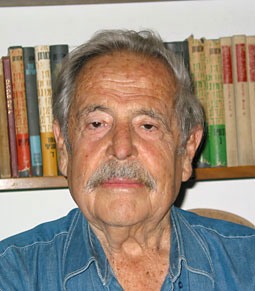The Poet Who Bridged the Gap
No matter what school an Israeli child attends, they will come out with a knowledge and an affection for the poems of Israel’s Poet Laureate, Haim Gouri. Israeli culture is well versed in the remarkable works of this literary genius. Born in what was British Mandate Palestine, Gouri came from a proudly Zionist family. His parents had sailed from Odessa to the Land of Israel, a year after the First World War. It was during the Second World War that Haim, now only twenty years old, enlisted into the Palmach, the elite commando force of the Jewish military underground.
“Gouri’s writings collectively expressed the grief of his people”
It was out of his army service in the Negev Desert during Israel’s subsequent bloody War of Independence that Gouri wrote of the terrible sacrifice of war. His writings collectively expressed the grief of his people. Many of his songs were set to music and became anthems in the national memory and in the Israeli pop charts.
With very little known about the scope and historicity of the Holocaust, after World War Two had ended, many of those who had lived in Israel during that time, had had their relatives murdered back in Europe. These people could not understand Holocaust survivors who had made it to Israel. They asked them with a good dose of judgement and suspicion, how was it that they had remained alive , while their families had been murdered. This expression of grief and confusion made for a great divide. Feeling accused, unwelcome, and fearful of rejection, Holocaust survivors chose to remain silent about their horrific experiences for fear of being judged.
Little did Haim Gouri know, but within just a few years, it would be his reporting on the Eichmann trial which would change these attitudes and bring a measure of healing to a traumatized state.
“Gouri’s reporting on the Eichmann trial would change attitudes and bring a measure of healing to a traumatized state”
For the Israelis who had not lived in Europe during the war, the Eichmann trial was the first time they heard the gruesome stories of survivors. Daily Gouri published articles and testimonies which ended up in newspapers on breakfast tables all over Israel. For Gouri himself, he said that it was only at the trial when he too began to slowly understand the geographical scope and widespread evil perpetrated against the Jews.
Gouri was especially struck with Mickey Goldman, a policeman at the trial who had been part of a team putting evidence together for the court case. Although Gouri and Goldman had had several encounters and conversations, it was not until Goldman’s testimony of cruelty he had experienced, did Gouri realise what he was potentially uncovering. He had had no idea that the young policeman had suffered being beaten 80 times with an iron rod.
After the hearings of that day, the shocked journalist approached Goldman and asked him why he had never mentioned his awful experience during the previous year while they had been working on and off together. Goldman replied that the last time he told his story to someone, they didn’t believe him. No one could go through that and survive, they told him. The young man clammed up. He vowed never to tell his story again: that was, until the trial.
Deeply moved by Goldman’s story, Gouri set out to make a movie called the “81st Blow.” The movie went down as one of the most iconic in Israeli history; the 81st blow being the fact that Goldman was not believed. In making the movie, Gouri put the suffering of the survivors into the public domain. He did so in a manner which invoked compassion. Gouri’s works became the catalyst of a measure of healing between immigrant Holocaust survivors and their fellow Jewish people who had spent the war years outside of the horrors, in relative safety in the Land of Israel.






